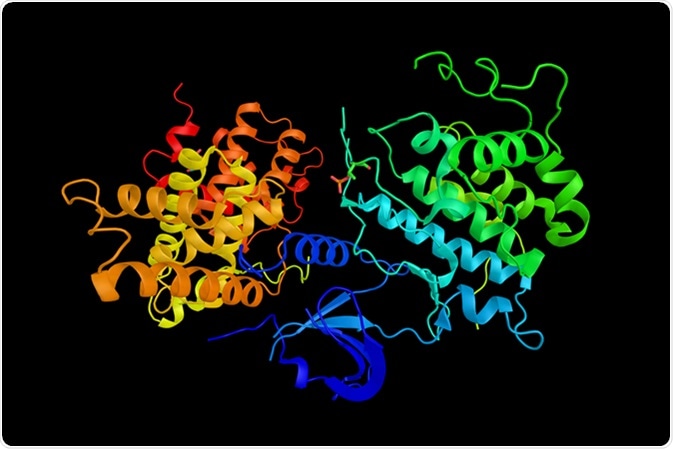Cyclin-dependent kinase 9 (CDK9) is a member of the CDK family, which is a very important group of proteins involved in the control of the cell cycle.
CDKs may be classified as multifunctional enzymes with the capacity for protein-substrate modifications that can allow or inhibit cell cycle progression.
In order to be active, CDKs require a family of proteins known as cyclins, which have no intrinsic enzymatic activity, but are necessary for the activation of CDKs.
In addition to cyclins, CDKs require phosphorylation and a second group of enzymes known as phosphatases, which are necessary for de-phosphorylation to occur, for CDKs to become activated.

Cyclin-dependent kinase 9, a cyclin-dependent kinase associated with P-TEFb. Involved in differentiation of skeletal muscle. 3d rendering. Image Credit: ibreakstock / Shutterstock
CDKs and the Cell Cycle
There are multiple cyclins paired with specific CDKs that are responsible for particular segments of the cell cycle.
Cyclins are named in accordance to the stage within the cell cycle that there is cyclin-CDK complexes assembling. There are therefore G1-, G1/S-, S-, and M-phase cyclins. For instance, there will be the formation of M-CDK complexes with M-phase cyclins that push the cell into the mitotic, or M-phase, of the cell cycle.
The CDKs are balanced in terms of their amount throughout the cell cycle; however, cyclin synthesis and breakdown varies. Thus, progression of the cell cycle is dependent on the synthesis and degradation of cyclins, which would lead to corresponding activation and inactivation of their CDKs.
Dr. Finn on Cyclin-Dependent Kinases and the Treatment of Cancer
CDK9
CDK9 has been found to be a constituent of TAK/P-TEFb, a multiprotein complex. This is an elongation factor during transcription directed by RNA polymerase II. It functions by phosphorylating RNA polymerase II’s largest subunit C-terminal domain.
There is the formation of a complex with this protein and cyclin K or cyclin T, which also play a role in its regulation. There have been many diseases linked to CDK9 in one way or the other. These include, but are probably not limited to, laryngeal tuberculosis, central nervous system vasculitis and HIV.
Association with the last disease was suggested when it was found that the HIV-1 Tat protein interacted with CDK9 and cyclin T.
CDK9 and HIV
HIV encodes for a small a small protein known as Tat, which is a protein required for the activation of the promoter that is found within the viral long terminal repeat (LTR). Tat is a strong transactivator and associates with the viral promoter through interacting with TAR, which is a nascent RNA transcript, and this, as a functional consequence, leads to the enhancement of the RNA polymerase II molecules’ processing ability. The details of P-TEFb, Tat and TAR interaction have been recently highlighted by some studies, which show a clear indication that the P-TEFb, CDK9 and cyclin T1 association is a target of the HIV encoded Tat protein.
Further Reading
Last Updated: Mar 21, 2019